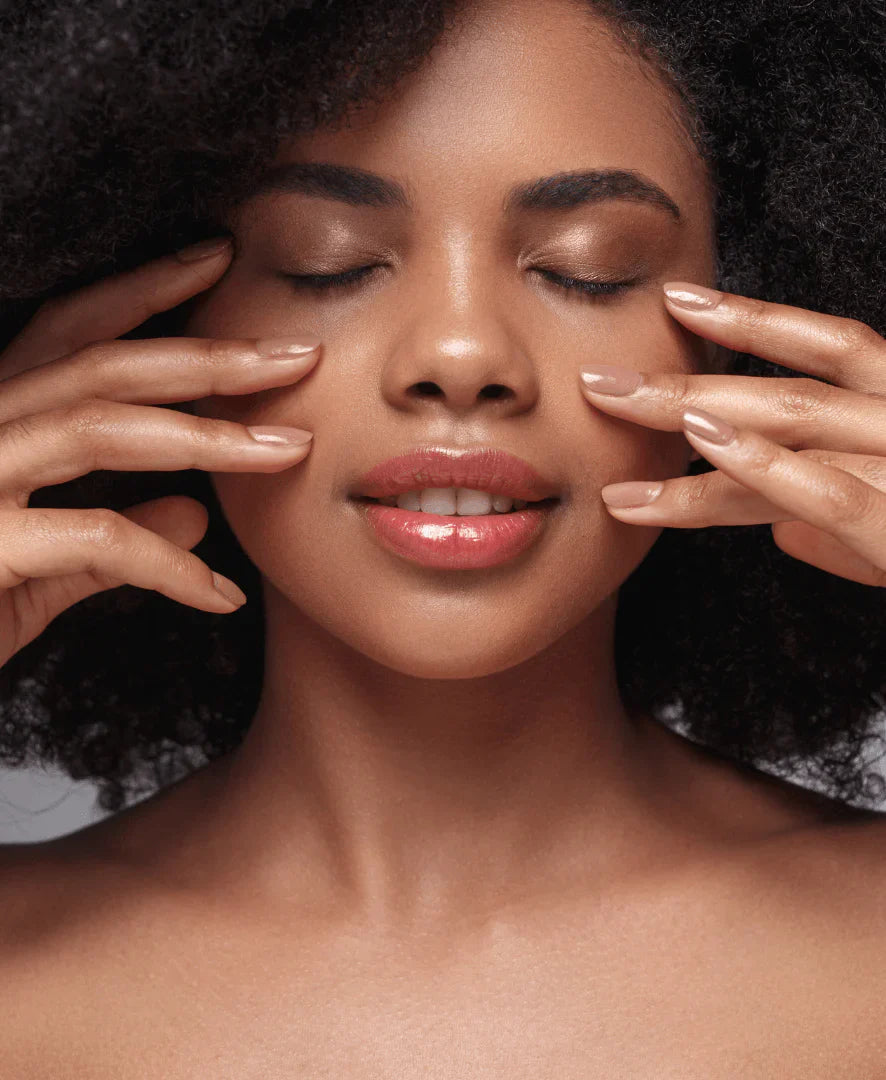
Normal skin
Normal skin is characterized by a balanced ratio of moisture and oil. It is smooth, supple, and has few blemishes. The pores are small and barely visible. Regular care with gentle, hydrating products helps maintain this ideal condition.
Features:
- Smooth, supple skin
- Few blemishes
Skin Texture & Pores:
- Fine, barely visible pores
Complexion:
- Fresh, radiant
Use lightweight moisturizers and mild cleansers to preserve your skin's natural balance.
Combination skin
Combination skin is characterized by a mix of dry and oily areas. Typically, the T-zone (forehead, nose, chin) is oily, while the cheeks are dry. Skincare for combination skin should be tailored to the different needs of these areas.
Features:
- Oily T-zone
- Dry cheeks
Skin Texture & Pores:
- Larger pores in the T-zone, fine pores on the cheeks
Complexion:
- Shiny in the T-zone, matte on the cheeks
Use hydrating products for dry areas and mattifying products for oily areas to achieve a balanced complexion.
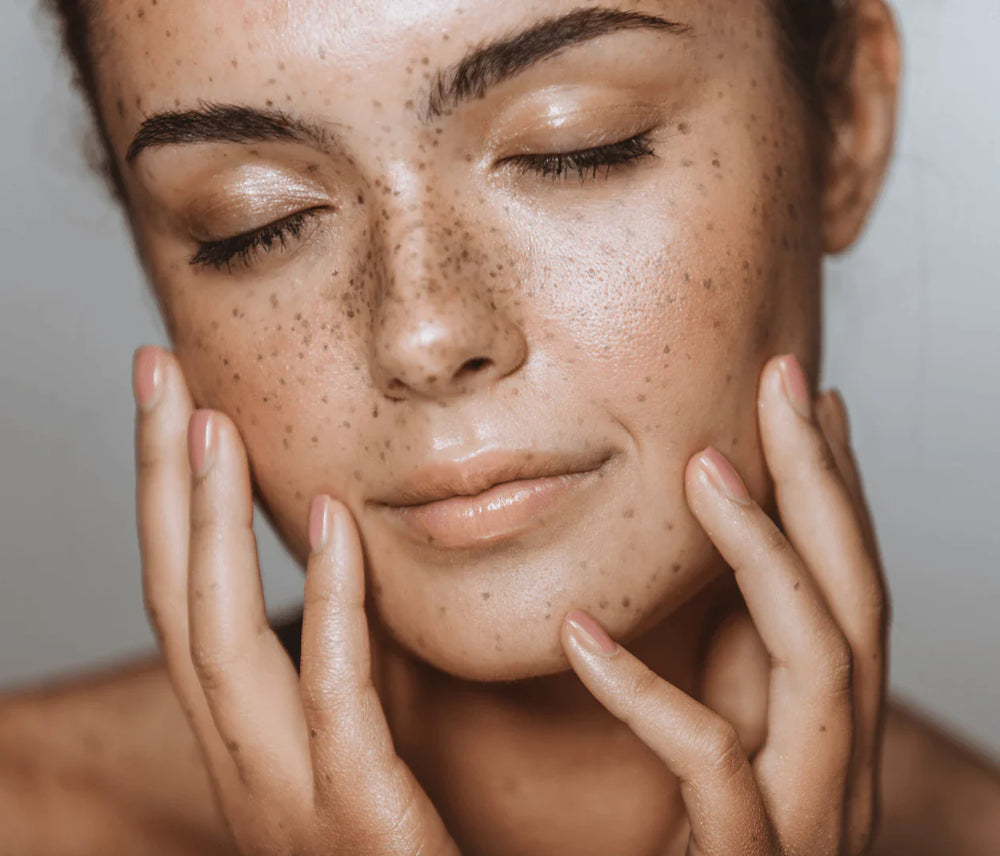

Dry skin
Dry skin tends to feel tight, with redness and flakiness. It produces less sebum and loses moisture quickly. Rich skincare with deeply hydrating and nourishing ingredients is essential.
Features:
- Tightness, flakiness
- Prone to redness
Skin Texture & Pores:
- Fine pores, dry and rough patches
Complexion:
- Matte, dull
Use nourishing creams and facial serums to strengthen the skin barrier and minimize moisture loss.
Oily skin
Oily skin produces excess sebum, leading to a shiny complexion and enlarged pores. This skin type is prone to blemishes like blackheads and pimples. A thorough but gentle cleansing routine is essential to remove excess oil without drying out the skin.
Features:
- Shiny film across the face
- Prone to acne
Skin Texture & Pores:
- Enlarged, clogged pores
- Tendency for blackheads, pustules, and pimples
Complexion:
- Shiny, uneven
- Redness due to blemishes
Use lightweight, oil-free skincare products that mattify the skin while providing hydration.
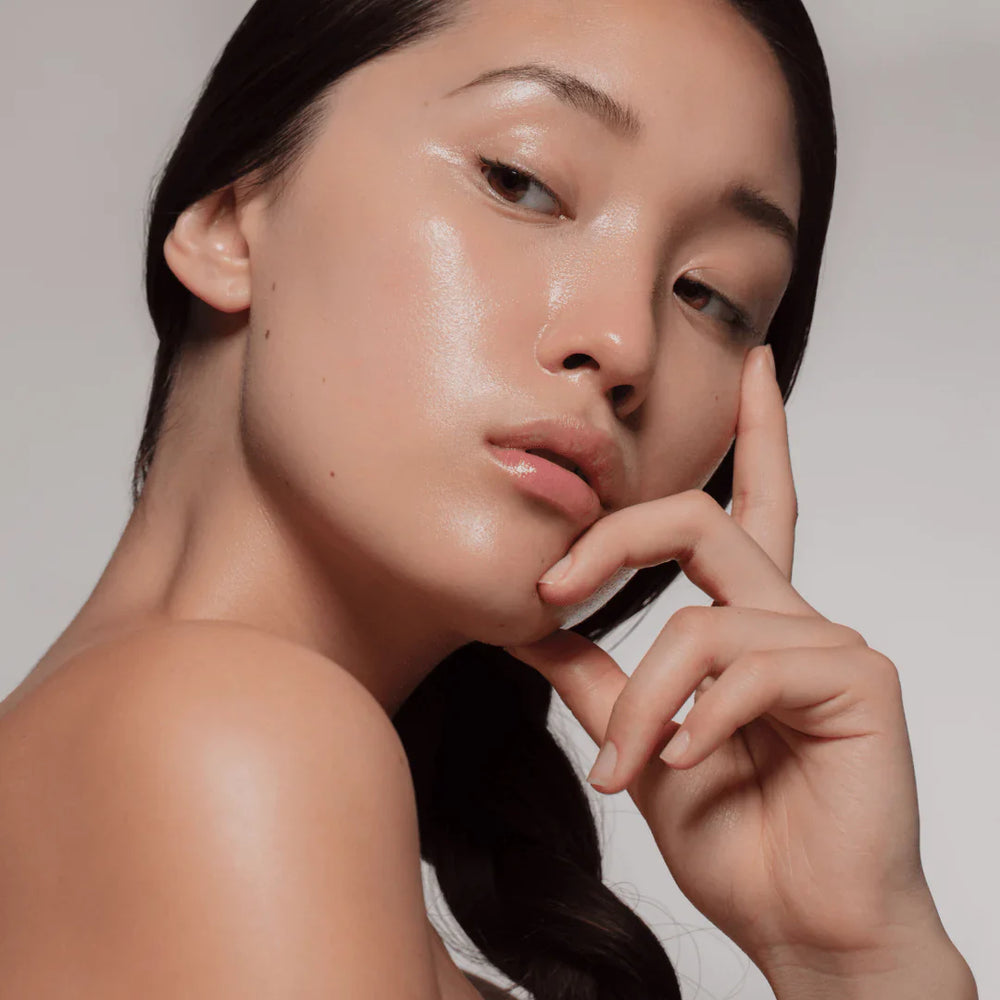
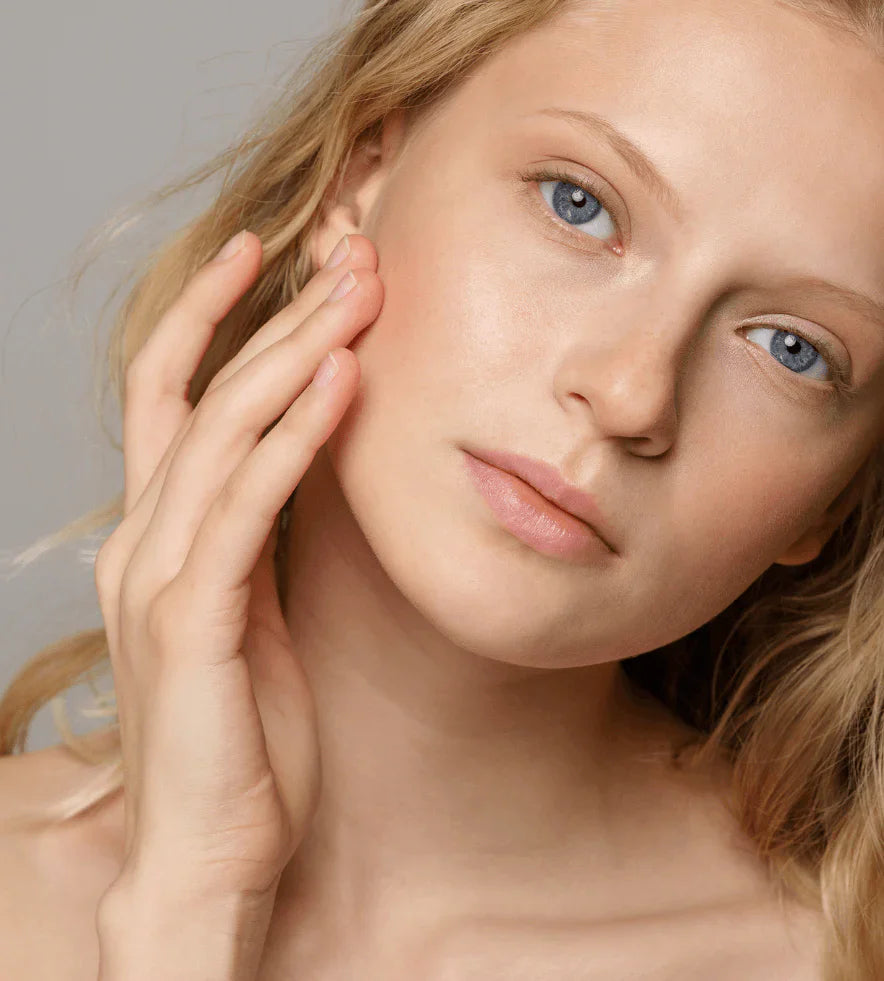
Sensitive skin
Sensitive skin reacts quickly to external factors such as weather, skincare products, or stress. It tends to redness, itching, and irritation. Calming and hypoallergenic care is essential.
Features:
- Prone to redness and itching
- Frequent irritations
Skin Texture & Pores:
- Fine pores, delicate skin barrier
Complexion:
- Uneven, often red
Use products with soothing ingredients like panthenol and aloe vera, which calm and strengthen the skin without causing irritation.
Impure skin
Impure skin is often characterized by acne, blackheads, and other blemishes, resulting from excess sebum production and clogged pores. Regular cleansing and using products with anti-inflammatory and antibacterial ingredients are crucial.
Features:
- Prone to acne, blackheads, and pimples
- Overproduction of sebum
Skin Texture & Pores:
- Enlarged, clogged pores
- Often inflamed
Complexion:
- Uneven, often red due to inflammation
Use non-comedogenic products that won't clog pores and help maintain skin balance.
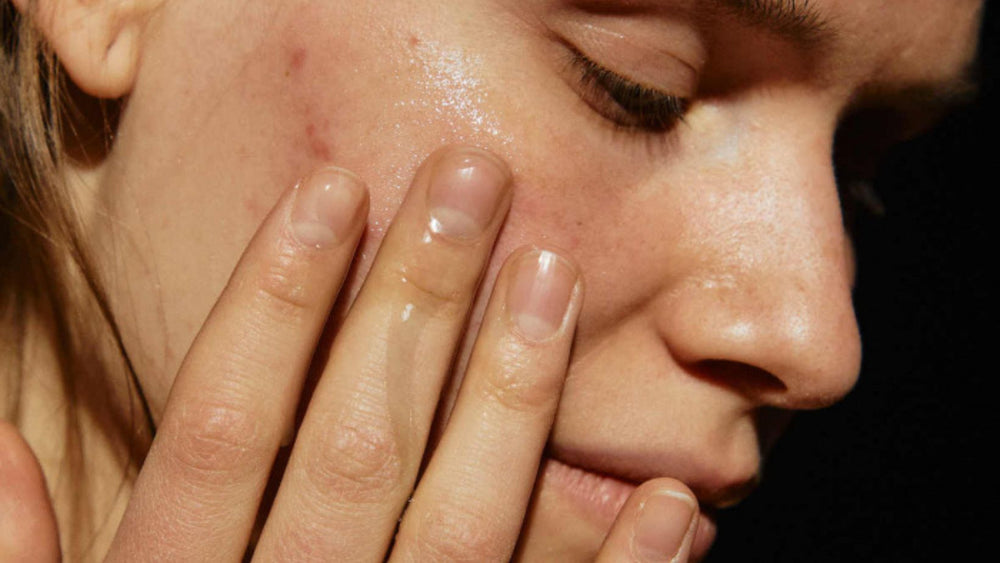
Understanding Your Skin – Identifying Its Needs
When you understand your skin, you can effectively address its needs. Knowing your skin’s structure and functions is essential to determine what it requires. This knowledge ensures that you choose the right skincare and avoid anything that could harm your skin.
The structure of our skin
The epidermis is the outermost layer of the skin, acting as a protective barrier against external influences. It consists of multiple layers of cells that are continuously renewed. This layer protects against UV radiation and plays a crucial role in the skin's immune system.
Key features of the epidermis:
- Protective barrier
- Waterproof
- UV protection
- Renewal of skin cells
Beneath the epidermis lies the dermis, which is rich in blood vessels, sebaceous glands, hair follicles, and nerves. This layer contains collagen and elastin, two proteins that give the skin its strength and elasticity. The dermis provides nutrients to the skin and supports wound healing.
Key features of the dermis:
- Contains blood vessels and nerves
- Collagen and elastin for strength and elasticity
- Supports nutrient supply
- Important for wound healing
Collagen fibers: Provide structural integrity and resilience to the skin.
Fibroblasts: Specialized cells that produce collagen and aid in wound healing and maintaining skin structure.
The subcutis, or hypodermis, is the deepest layer of the skin, primarily composed of fat tissue that serves as an energy reserve. It protects the body from cold and mechanical impacts like pressure and shocks. The composition of this layer can be influenced by diet and lifestyle.
Key features of the subcutis:
- Fat tissue as an energy reserve
- Protection against cold and mechanical impacts
- Modifiable through diet and lifestyle
Sebaceous glands produce sebum, an oily secretion that protects the skin from drying out and acts as a barrier against bacteria. Sebum is composed of various lipids that keep the skin supple.
Key features of sebum:
- Protects against dryness
- Acts as a barrier against bacteria
- Composed of lipids such as squalane and fatty acids
Sweat glands are responsible for regulating the body's temperature. They produce sweat, which is primarily composed of water, along with a small amount of ions and other substances. The evaporation of sweat from the skin's surface cools the body.
Key features of sweat:
- Temperature regulation
- Primarily composed of water
- Contains ions and organic substances
The hydrolipid film is a mixture of sebum, sweat, and other skin secretions. This film protects the skin from external influences and keeps it supple. The acid mantle, a component of the hydrolipid film, ensures that the skin is protected against bacteria and fungi.
Key features of the hydrolipid film:
- Protection from external influences
- Keeps the skin supple
- Part of the acid mantle
Main functions of the skin
The skin is the largest organ of the human body and performs numerous vital functions:
- Protection: Acts as a barrier against microorganisms, chemicals, injuries, and UV radiation.
- Temperature regulation: Helps maintain body temperature through sweating and blood vessel regulation.
- Sensation: Contains nerve endings for detecting pressure, pain, temperature, and touch.
- Water balance: Prevents excessive water loss.
- Immune defense: Contains immune cells to fight pathogens.
- Vitamin D synthesis: Synthesizes Vitamin D under UVB exposure.
- Energy storage: Stores fat for energy and protection.
- Wound healing: Repairs and regenerates tissue.
As you can see, our skin is incredibly versatile and essential for our well-being.
Internal factors influencing the skin
Your genetic predisposition plays a crucial role in determining your skin type, skin color, and susceptibility to certain skin issues like acne or eczema. Genes influence how your skin reacts to external factors and how it changes over time.
Fluctuations in hormone levels can significantly impact your skin. During puberty, pregnancy, menopause, or the menstrual cycle, hormone levels change, which can lead to various skin issues such as acne or increased sensitivity.
A balanced diet rich in vitamins, minerals and antioxidants is essential for healthy skin. A lack of nutrients can lead to skin problems such as dryness, inflammation and premature aging.
High stress levels can increase the production of stress hormones like cortisol, leading to skin issues such as acne, redness, and other inflammations. Chronic stress can accelerate skin aging and weaken the skin barrier.
As we age, the production of collagen and elastin decreases. This results in thinner skin, loss of elasticity, and the formation of wrinkles and sagging skin. While these natural aging processes are inevitable, they can be slowed down with proper skincare.
Certain diseases and health conditions, such as diabetes or thyroid disorders, can affect skin health. These conditions may cause the skin to become drier, impair its healing ability, and increase its susceptibility to infections.
External factors influencing the skin
Excessive sun exposure can lead to sunburn, premature skin aging, and skin cancer. UV rays penetrate the skin cells and damage the DNA, resulting in long-term damage.
Pollutants in the air, such as fine dust and exhaust fumes, can weaken the skin barrier, lead to inflammation, and accelerate the aging process. Environmental pollution contributes to the formation of free radicals, which damage skin cells.
Extreme weather conditions, such as cold, heat, wind, and humidity, can put significant stress on the skin. Cold weather can dry out the skin, while hot and humid climates can increase oil production and lead to oily skin.
Using unsuitable or aggressive skincare products can irritate the skin and weaken its protective barrier. It is important to choose products that are suitable for your skin type and free from potentially harmful additives.
Lack of hygiene can lead to the accumulation of bacteria, dirt, and excess oil on the skin, which promotes impurities and infections. Regular, gentle cleansing is important to keep the skin clean and healthy.
Nicotine and other chemicals in tobacco smoke constrict blood vessels and reduce blood flow to the skin. This leads to poor wound healing and accelerates skin aging, resulting in wrinkles and a dull complexion.





